ACRocket
From Data Realms Wiki
|
ACRocket | |
 A rocket using its thrusters to fly into an opposing rocket that is using its legs to lands, and its exit to eject an enemy unit. In the aftermath, both rockets' gibs will crush the newly deployed enemy unit. |
|
| Class Information | |
| Class Name: | ACRocket |
| Parent: | Actor |
| Limbs: | 1 main thruster, 2 retro thrusters, 2 side thrusters, 2 legs |
| Abilities: | |
| Flying, Landing, Cargo Ejection/Loading, Scuttle, Orbital return. | |
| Infobox Template: ActorClass | |
ACRockets are a subclass of actors that are rockets. Their name is an amalgam of Actor, Craft, and Rocket.
ACRockets have 5 emitters that are used for thrust and stabilization. This includes one main downward thruster activated by Up, two "retro thrusters" both activated by Down, and two side thrusters, activated by Left and Right. These emitters grant ACRockets the ability to fly with much agility. They also have legs, which help the rocket to absorb landing impact and stand still when landed.
Being a type of craft, ACRockets can hold actors and devices in their inventory, and can eject them and board through exits. The exit opening is generally visually represented by an animation of the rocket's doors opening. The exits, when open and not still ejecting, have 'tractor beams' of variable length, width, and power, that can pull actors and devices in to the exit. They are visually represented by dotted yellow lines, with dots moving inward. Dots moving outward is a sign that cargo is still being ejected. Crafts can be flown above the top of the level to be returned to Trade Star Midas, selling the for the value of them and their contents, which is affected by health. Crafts also generally gib into a lethal mess of falling debris, killing occupants and actors below. Crafts also have a scuttling ability, accessibly through the pie menu, which self destructs them. When a craft senses that it is as good as dead, it automatically scuttles. This sense is currently flawed, as it may self destruct simply by hovering in the air.
For an example of an ACRocket, click here.